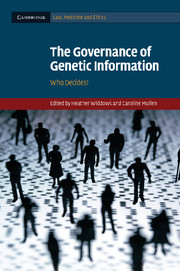Introduction
Published online by Cambridge University Press: 02 February 2010
Summary
The governance of genetic information is relevant to issues of health, welfare, privacy and of personal and communal identity. This volume seeks to map this complex and difficult terrain and move beyond it by making positive suggestions for the restructuring and design of ethical frameworks for governance in this area. It sets out the key areas of ethical concern in the governance debate in a way which clarifies the significant features of genetic information and the problems of how it is ascribed, controlled and regulated in order that the complexities of genetic governance can be understood. This book seeks not merely to describe the areas of controversy and ethical dilemma but to drive the debate forwards and break new ground. It offers suggestions and alternatives, in terms of ethical frameworks and models of regulation, which it is hoped will inform the theory and practice of good governance. Accordingly this book intends to speak not only to academics, but to practitioners, participants in research and, perhaps most importantly, to policy makers. For genetic governance is not merely an interesting philosophical problem – although undoubtedly it is this – but more importantly it is an issue at the heart of medical and scientific developments and governance and one that touches on governance in general and globally. For example, issues which are connected to the governance of genetic information include issues of global exploitation, issues of commodification, commercialisation and ownership, conceptions of property and intellectual property and concerns about individual and communal identity and notions of public good.
- Type
- Chapter
- Information
- The Governance of Genetic InformationWho Decides?, pp. 1 - 12Publisher: Cambridge University PressPrint publication year: 2009



